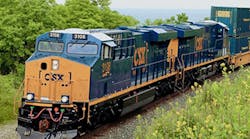CSX Service Deterioration Is Driving Freight to Other Railroads and Trucks
Just how bad has service deteriorated since new CEO Hunter Harrison took over Class I railroad CSX Transportation a few months ago? Listen to what shippers have to say:
“Truly awful! Could not have done a better job designing the worst possible service model. On most days we do not get a switch even though we are scheduled for five a week,” one shipper told financial research company Cowen & Co. in a recent survey of CSX customers.
“After begging we might get one; however, we do not get the correct number of cars or even the right car numbers. This is what happens when you place shareholder value ahead of customer success. I hope you are happy—we aren’t.”
Another shipper told the Cowen researchers: “Been a complete disaster. Little communication. When there is, the info is wrong. Major delays in transit. Empty cars not getting returned timely. Missed switches. Converting to truck where we can. Experienced some plant downtime as a result.”
Even coal shippers, usually favored by freight railroads, have suffered badly. Chairman Robert Murray of Murray Energy Corp. told the Surface Transportation Board that CSX service has worsened significantly since Harrison joined the railroad last March. “This situation has become absolutely intolerable and must be resolved immediately,” he said.
Paul Lang, COO of Arch Coal Inc., the nation’s second largest U.S. coal producer behind Peabody Energy Co., observed during a July 27 earnings conference call, “Frankly, the problems have gotten worse in the last 10 days,” and noted that the poor service is negatively impacting export coal shipments.
In fact, so many shippers are abandoning CSX for its direct rail competitor Norfolk Southern that Cowen is predicting third quarter earnings gains for NS as a result. Where shippers cannot leave CSX for NS, they are switching freight to over-the-road trucking, and where they can’t do either, they are stewing and complaining to the government.
More than 80% of the CSX shippers who responded to Cowen’s survey said service declined after Harrison took charge. “Shippers are moving or have already moved freight off of CSX where they can,” Cowen said. Nearly 40% of those polled say they switched some freight to NS and 67% have transferred freight to trucks where they can.
Once you remove from the mix those shippers who are incapable of moving their freight away from CSX, the situation darkens considerably. For those shippers who are not considered captive (meaning they have no access to any railroad other than CSX), nearly half are moving at least some of their business to NS. When you exclude the shippers who are unable to move their freight to trucks, 76% of those who can do so report they have switched at least some freight to truckers.
The STB Intervenes
STB also met with senior CSX officials in late July to discuss the service deterioration. On July 27 the commissioners sent a letter to Harrison that instructed him to call the STB on a weekly basis to discuss the railroad’s performance issues and how CSX management is working to resolve them.
“We are very troubled by the apparent lack of communication with customers and urge your immediate attention to remedy this situation,” the board told Harrison. CSX later stated publicly that it will provide the information requested and “will respond fully and factually to the STB complaint.”
The STB expects CSX to supply data regarding yard congestion, interchanges with other Class I railroads, and equipment and manpower availability, local spot and pull reports, as well as service to customers with critical needs. The board also told the company to set up a service hotline for its customers, and provide frequent operations updates to its customers, both directly and through the CSX website.
Shipper complaints the board received include increased transit times, unreliable switching operations, inefficient car routings, poor communications and coordination with CSX customer service, and acute disruption to customers’ business operations.
Since taking charge of CSX earlier this year, Harrison has cut 2,300 employees and sidelined 900 pieces of rolling stock in his quest for a lower operating ratio, admitting that this effort would result in a decline of service in some areas. He recently added that he expects 300 more jobs will be lost and 100 more pieces of equipment taken out of service by the end of the year. Harrison also said that while the railroad started the year with 12 hump yards, those could be reduced to only three by the end of 2017.
Harrison joined CSX this spring after the rail company’s board agreed to pay him $300 million in compensation for losses in payments from Canadian Pacific when he walked away from that firm. His way was smoothed by a hedge fund that had invested in CSX to the extent of being able to place members on the company’s board.
In 2015-16 Harrison had been deeply involved in an attempted takeover of CSX by CP that had been ramrodded by a different hedge fund operator with a significant stake in CP. That merger proposal failed after it ran into a buzz saw of opposition from CSX management, other railroads and shippers, and questions raised by the STB.
Both last year’s merger attempt and the recent deal to install Harrison as CEO were predicated on the notion that he could make the same operational and managerial changes he did at CP to lower CSX’s operating ratio, which would increase the rail company’s stock value.
Once again shippers are looking to the STB to intervene on their behalf. Although the board’s directives were phrased as requests, they represent a tougher stance than it has taken towards the railroads in a long time, much to the consternation of shipper groups who want to see the board act more swiftly and decisively. Congress passed a law in 2015 adding to the board’s powers and expanding its membership from the current three to five members, but neither Obama nor Trump moved to fill those additional seats.
“Without a full set of members for the STB, none of these reforms can move forward, and shippers across the nation will remain at the mercy of rail carriers that face no competition,” Donna Harman, president of the American Forest & Paper Association, and Mark Kowlzan, chairman and CEO of Packaging Corporation of America, declared in a recent joint public statement.
“The bad news is that the STB has two open board seats, and until they get nominated by the President and confirmed by the Senate, efforts to better protect shippers are stalled,” they stressed. “The President and the Senate should act now to nominate and confirm objective candidates committed to moving the STB forward instead of preserving the status quo.”
Harrison’s Wild Words
Harrison’s attempt at a public apology did little to assuage shipper criticism and actually may have made things worse because he appeared to shift the blame to the railroad’s workforce, provoking CSX’s unions to jump into the debate.
In his Aug. 2 e-mail to customers, Harrison wrote, “The pace of change at CSX has been extremely rapid, and while most people at the company have embraced the new plan, unfortunately, a few have pushed back and continue to do so. This resistance to change has resulted in some service disruptions. To those customers that have experienced such issues, we sincerely apologize.”
John Risch, national legislative director of the SMART Union Transportation Division, which represents many of CSX’s operations employees, took issue with Harrison’s statement, blaming the widespread train delays on operational changes made by the CEO, including the doubling of train sizes and shutting down hump yards. “No one is more to blame for CSX’s service disruptions than the man who ordered the dramatic changes to operations, and that’s Hunter Harrison,” he stated.
The SMART union’s top leadership responded in an Aug. 3 letter to Harrison that noted their union members have had no opportunity to provide input about the operational changes. They also slammed management’s failure to communicate adequately with its employees about those changes.
The union’s leaders termed Harrison’s criticism of their members as “a personal attack on their professionalism. Your letter was a kick to the gut and a severe blow to their morale,” they wrote in a letter to Harrison. Other CSX unions have said they agreed with SMART’s response.
This wasn’t the first time Harrison’s words have gotten him in trouble. During a July 19 earnings conference call, he reported that the changes he instituted caused CSX’s operating ratio to decline slightly from 69.4 in 2016 to 67.4 in the second quarter. Revenue climbed 8% and second quarter net earnings were $510 million, $65 million above the same quarter last year.
Explaining the thousands of firings, Harrison explained at that time, “We can’t carry dead weight. Everybody has to do their job, everybody has to do their part.”
CSX stock took an immediate hit after the 73-year-old Harrison said, “I’m a short-timer here. I’m the interim person that’s going to try to get this company to the next step and good foundation.” Last May, he admitted to using an oxygen tank and having to work from home several days a week because of an undisclosed medical condition.
Harrison also grabbed headlines by predicting that environmental restrictions will result in the end of coal hauling for the railroads. “Fossil fuels are dead,” he declared. “It’s not going to happen overnight. Coal is not a long-term issue. It’s not going to be two or three years, but it’s going away, in my view.”
As a result, Harrison said that unless something changes drastically, “we’re not going to go out and put a double track in, or buy locomotives or anything for coal.” However, coal hauling has been one of the few bright spots when it comes to CSX traffic. In its second quarter it hauled 195,233 carloads of coal compared with 176,342 carloads in the second quarter of 2016.
Other business lines declined in the second quarter, including grain, which dropped 10.5%; petroleum, which plunged 12.5%; forest products, down 11%; and iron, steel and scrap, also off 11%. By contrast, intermodal traffic was up 3% for the quarter, although that is expected to decline because of Harrison’s emphasis on higher-profit freight.




